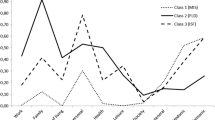Abstract
The present study explored the constituents of lay conceptions of happiness and its determinants among young adults of the Igbos of Eastern Nigeria. Participants were asked to define happiness and outline the things they think make people happy. Analyses of the responses revealed that participants defined happiness with words reflecting both affect and cognitive evaluation of life. Positive affect words dominated the definitions followed by words reflecting cognitive evaluation of life. Interestingly, participants were more likely to define happiness with focus on the self than with focus on the other, which is contrary to seeming suggestions in literature that non-Western societies view happiness from communalistic perspectives. Significant gender differences occurred in line with findings that females are more likely to express interdependent views of happiness while males usually take individualistic route. Participation, affection, and leisure needs topped participants’ descriptions of the things that make people happy. Interesting relationships emerged among the variables with some contradicting and others confirming previous findings. Implications and limitations of findings were discussed. Suggestions for further studies were also made.
Similar content being viewed by others
References
Agbo, A. A., Nzeadibe, T. C., & Ajaero, C. K. (2012). Happiness in Nigeria: A socio-cultural analysis. In H. Selin & G. Davey (Eds.), Happiness across cultures: Views of happiness and quality of life in non-Western cultures (pp. 293–310). Netherland: Springer.
Awolowo, O. (1947). Path to Nigerian freedom. London: Faber and Faber.
Bagozzi, R. P., Wong, N., & Yi, Y. (1999). The role of culture and gender in the relationship between positive and negative affect. Cognition and Emotion, 13, 641–672.
Benet-Martínez, V., & Karakitapoglu-Aygün, Z. (2003). The interplay of cultural syndromes and personality in predicting life satisfaction comparing Asian Americans and European Americans. Journal of Cross-Cultural Psychology, 34, 38–60.
Bojanowska, A., & Zalewska, A. M. (2015). Lay understanding of happiness and the experience of well-being: Are some conceptions of happiness more beneficial than others? Journal of Happiness Studies. doi:10.1007/s10902-015-9620-1.
Brautigan, D. (1997). Substituting the state: institution and industrial development in Eastern Nigeria. World Development, 25, 1063–1080.
Chen, F. F., Jing, Y., Hayes, A., & Lee, J. M. (2012). Two concepts of two approaches? A bifactor analysis of psychological and subjective well-being. Journal of Happiness Studies. doi:10.1007/s10902-012-9367-x.
Costanza, R., Fisher, B., Ali, S., Beer, C., Bond, L., Boumans, R., et al. (2007). Quality of life: An approach integrating opportunities, human needs, and subjective well-being. Ecological Economics, 61, 267–276.
Cronje, S. (1972). The world and Nigeria. London: Sidgwick and Jackson.
D’raven, L. L., & Pasha-Zaidi, N. (2015). Using the PERMA model in the United Arab Emirates. Social Indicators Research. doi:10.1007/s11205-015-0866-0.
Darwin, M., Egerton, W., Falconer, D., & Kiston, A. E. (1913). Southern Nigeria: Some considerations of its structure, people, and natural history: Discussion. The Geographical Journal, 41, 34–38.
Delle Fave, A., Brdar, I., Freire, T., Vella-Brodrick, D., & Wissing, M. P. (2011). The eudaimonic and hedonic components of happiness: Qualitative and quantitative findings. Social Indicators Research, 100, 185–207.
Diener, E. (1984). Subjective well-being. Psychological Bulletin, 95, 542–575.
Diener, E. (2000). Subjective well-being: The science of happiness and a proposal for a national index. American Psychologist, 55(1), 34.
Diener, E., & Suh, E. M. (2000). Culture and subjective well-being. Cambridge, MA: MIT Press.
D’raven, L. L., & Pasha-Zaidi, N. (2014). Happiness in the United Arab Emirates: conceptualisations of happiness among Emirati and other Arab students. International Journal of Happiness and Development, 2, 1–21.
Eid, M., & Diener, E. (2001). Norms for experiencing emotions in different cultures: inter- and intranational differences. Journal of Personality and Social Psychology, 81, 869.
Fischer, A. H., Rodriguez Mosquera, P. M., Van Vianen, A. E., & Manstead, A. S. (2004). Gender and culture differences in emotion. Emotion, 4, 87.
Fredrickson, B. L. (2001). The role of positive emotions in positive psychology: The broaden-and-build theory of positive emotions. American Psychologist, 56, 218.
Guimond, S., Armand, C., Delphine, M., Richard, J. C., & Sandrine, R. (2006). Social compaison, self-stereotyping, and gender differences in self-construals. Journal of Personality and Social Psychology, 90, 221–242.
Hayes, A. F. (2009). Beyond Baron and Kenny: Statistical mediation analysis in the new millennium. Communication Monographs, 76, 408–420. doi:10.1080/03637750903310360.
Henderson, L. W., & Knight, T. (2012). Integrating the hedonic and eudaimonic perspectives to more comprehensively understand wellbeing and pathways to wellbeing. International Journal of Wellbeing, 2, 196–221.
Huta, V., & Ryan, R. M. (2010). Pursuing pleasure or virtue: The differential and overlapping well-being benefits of hedonic and euadaimonic motives. Journal of Happiness, 11, 735–762.
Huta, V., & Waterman, A. S. (2014). Eudaimonia and its distinction from hedonia: Developing a classification and terminology for understanding conceptual and operational definitions. Journal of Happiness Studies, 15, 1425–1456.
Ip, P. K. (2011). Concepts of Chinese folk happiness. Social Indicators Research, 104, 459–474.
Joshanloo, M., & Weijers, D. (2014). Aversion to happiness across cultures: A review of where and why people are averse to happiness. Journal of Happiness Studies, 15, 717–735.
Kashdan, T. B., Biswas-Diener, R., & King, L. A. (2008). Reconsidering happiness: The costs of distinguishing between hedonics and eudaimonia. Journal of Positive Psychology, 3, 219–233.
Keyes, C. L., Fredrickson, B. L., & Park, N. (2012). Positive psychology and the quality of life. In K. C. Land, et al. (Eds.), Handbook of social indicators and quality of life research (pp. 99–112). Netherlands: Springer.
Keyes, C. L. M., Shmotkin, D., & Ryff, C. D. (2002). Optimizing well-being: The empirical encounter of two traditions. Journal of Personality and Social Psychology, 82, 1007–1022.
Kitayama, S., Mesquita, B., & Karasawa, M. (2006). Cultural affordances and emotional experience: socially engaging and disengaging emotions in Japan and the United States. Journal of Personality and Social Psychology, 91, 890.
Korieh, C. J. (2006). African ethnicity as mirage? Historicizing the essence of the Igbo in Africa and the Atlantic diaspora. Dialectical Anthropology, 30, 91–118.
Layous, K., Lee, H., Coi, I., & Lymbomirsky, S. (2013). Culture matters when designing a successful happiness-increasing activity: A comparison of the United States and South Korea. Journal of Cross-Cultural Psychology, 44, 1294–1303.
Lu, L. (2001). Understanding happiness: A look into the Chinese folk psychology. Journal of Happiness Studies, 2, 407–432.
Lu, L., & Gilmour, R. (2004). Culture and conceptions of happiness: Individual oriented and social oriented SWB. Journal of Happiness Studies, 5, 269–291.
Lyubomirsky, S., King, L., & Diener, E. (2005a). The benefits of frequent positive affect: Does happiness lead to success? Psychological Bulletin, 131, 803–855.
Lyubomirsky, S., Sheldon, K. M., & Schkade, D. (2005b). Pursuing happiness: The architecture of sustainable change. Review of General Psychology, 9, 111.
McMahan, E. A., & Estes, D. (2011). Measuring lay conceptions of well-being: The beliefs about well-being scale. Journal of Happiness Studies, 12, 267–287.
McMahan, E. A., & Estes, D. (2012). Age-related differences in lay conceptions of well-being and experienced well-being. Journal of Happiness Studies, 13, 79–101.
National Bureau for Statistics (NBS). (2010). National Literacy Survey. Available at www.nigeriastat.gov.ng.
National Bureau of Statistics (NBS). (2014). The Nigeria Poverty Profile 2014 Report. National Bureau of Statistics, Abuja.
Oishi, S., & Diener, E. (2014). Can and should happiness be a policy goal? Policy Insights from the Behavioural and Brain Sciences, 1, 195–203.
Oishi, S., Graham, J., Kesebir, S., & Galinha, I. C. (2013). Concepts of happiness across time and cultures. Personality and Social Psychology Bulletin, 39, 559–577.
Oishi, S., & Schimmack, U. (2010). Culture and well-being: A new inquiry into the psychological wealth of nations. Perspectives on Psychological Science, 5, 463–471.
Oyserman, D., Coon, H., & Kemmelmeier, M. (2002). Rethinking individualism and collectivism: Evaluation of theoretical assumptions and meta-analyses. Psychological Bulletin, 128, 3–72.
Peng, K., & Nisbett, R. E. (1999). Culture, dialectics, and reasoning about contradiction. American Psychologist, 54, 741–754.
Peterson, C., & Seligman, M. E. P. (2004). Character strengths and virtues: A classification and handbook. Washington, DC: American Psychological Association.
Pflug, J. (2009). Folk theories of happiness: A cross-cultural comparison of conceptions of happiness in Germany and South Africa. Social Indicators Research, 92, 551–563.
Raibley, J. R. (2012). Happiness is not well-being. Journal of Happiness Studies, 13, 1105–1129.
Ryan, R. M., & Deci, E. L. (2000). Self-determination theory and the facilitation of intrinsic motivation, social development, and well-being. American Psychologist, 55, 68–78.
Ryan, R. M., & Deci, E. L. (2001). On happiness and human potentials: A review of research on hedonic and eudaimonic well-being. Annual Review of Psychology, 52, 141–166.
Ryff, C. D. (1989). Happiness is everything, or is it? Explorations on the meaning of psychological wellbeing. Journal of Personality and Social Psychology, 57, 1069–1081.
Safdar, S., Friedlmeier, W., Matsumoto, D., Yoo, S. H., Kwantes, C. T., Kakai, H., & Shigemasu, E. (2009). Variations of emotional display rules within and across cultures: A comparison between Canada, USA, and Japan. Canadian Journal of Behavioural Science, 41, 1–10.
Sastre, M. T. M. (1999). Lay conceptions of well-being and rules used in well-being judgements among young, middle-aged, and elderly adults. Social Indicators Research, 47, 203–231.
Schimmack, U. (2007). Methodological issues in the assessment of the affective component of subjective well-being. In A. Ong & M. H. M. van Dulmen (Eds.), Oxford handbook of methods in positive psychology (pp. 96–110). New York: Oxford University Press.
Schimmack, U., Oishi, S., Diener, E., & Suh, E. (2000). Facets of affective experiences: A framework for investigations of trait affect. Personality and Social Psychology Bulletin, 26, 655–668.
Schimmack, U., Radhakrishnan, P., Oishi, S., Dzokoto, V., & Ahadi, S. (2002). Culture, personality, and subjective well-being: integrating process models of life satisfaction. Journal of Personality and Social Psychology, 82, 582–593.
Schmitt, D. P., Realo, A., Voracek, M., & Allik, J. (2008). Why can’t a man be more like a woman? Sex differences in Big Five personality traits across 55 cultures. Journal of Personality and Social Psychology, 94, 168.
Seligman, M. (2002). Authentic happiness: Using the new positive psychology to realize your potential for lasting fulfilment. New York: Free Press.
Seligman, M. (2011). Flourish: A visionary new understanding of happiness and well-being. New York: Simon & Schuster.
Stavrova, O., Fetchenhauer, D., & Schlösser, T. (2013). Why are religious people happy? The effect of the social norm of religiosity across countries. Social Science Research, 42, 90–105.
Suh, E., Diener, E., Oishi, S., & Triandis, H. C. (1998). The shifting basis of life satisfaction judgments across cultures: Emotions versus norms. Journal of Personality and Social Psychology, 74, 482.
Suh, E. M., & Koo, J. (2008). Comparing subjective well-being across cultures and nations: The “what” and “why” questions. In M. Eid & R. J. Larsen (Eds.), The science of subjective well-being (pp. 414–427). New York, NY: Guilford Press.
Tov, W., & Diener, E. (2007). Culture and subjective well-being. In S. Kitayama & D. Cohen (Eds.), Handbook of cultural psychology (pp. 691–713). New York: Guilford Press.
Uchida, Y., Norasakkunkit, V., & Kitayama, S. (2004). Cultural constructions of happiness: Theory and empirical evidence. Journal of Happiness Studies, 5, 223–239.
Uchida, Y., & Ogihara, Y. (2012). Personal or interpersonal construal of happiness: A cultural psychological perspective. International Journal of Wellbeing, 2, 354–369.
Veenhoven, R. (2008). Healthy happiness: Effects of happiness on physical health and the consequences for preventive health care. Journal of Happiness Studies, 9, 449–469.
Veenhoven, R. (2012). Does happiness differ across cultures? In H. Selin & G. Davey (Eds.), Happiness across cultures (pp. 451–472). Netherlands: Springer.
Waterman, A. S. (1993). Two conceptions of happiness—contrasts of personal expressiveness (eudaimonia) and hedonic enjoyment. Journal of Personality and Social Psychology, 64, 678–691.
Wong, Y. J., Ho, R. M., Li, P., Shin, M., & Tsai, P. C. (2011). Chinese Singaporeans’ lay beliefs, adherence to Asian values, and subjective well-being. Personality and Individual Differences, 50, 822–827.
Author information
Authors and Affiliations
Corresponding author
Rights and permissions
About this article
Cite this article
Agbo, A.A., Ome, B. Happiness: Meaning and Determinants Among Young Adults of the Igbos of Eastern Nigeria. J Happiness Stud 18, 151–175 (2017). https://doi.org/10.1007/s10902-016-9722-4
Published:
Issue Date:
DOI: https://doi.org/10.1007/s10902-016-9722-4




